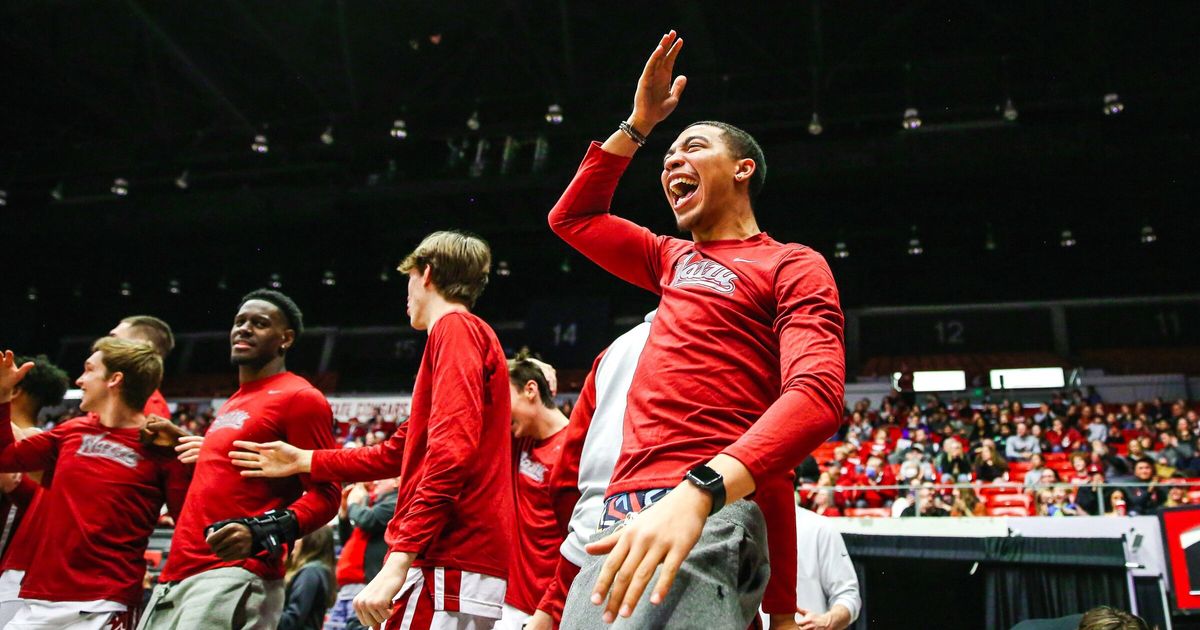
Washington State redshirt freshman guard Myles Rice was home in Georgia this past summer when his aunt noticed a lump on his neck.
Rice did not think much of it, but when he got back to Pullman, he got a biopsy. The result, in late September, was that he had non-Hodgkin’s lymphoma, a cancer in which white blood cells (lymphocytes) grow abnormally and can form tumors throughout the body.
“I found out on my mom’s birthday so I had to call and tell her on her birthday,” Rice said.
When Rice told his father, Joel Rice, that he didn’t think he could play this season, “I kind of broke down a little bit and cried.”
“He said, ‘Everything happens for a reason and God is in your corner,’ ” Myles Rice said. “He said, ‘You’ve got to have faith and keep pushing and know that there’s a light at the end of the tunnel and you’ve got to keep striving for that.’ ”
Rice’s basketball plans suddenly changed after the cancer diagnosis. He was excited for this season after redshirting in 2021-22, and WSU coach Kyle Smith had high expectations for his young, highly-touted guard.
The return to games will now wait another year as Rice continues chemotherapy while still going to school. He is using his platform as a college basketball player to share his experiences with cancer, hoping that it might uplift others in similar situations.
Rice and Smith will be in the spotlight this weekend in Pullman as the Cougars host Arizona State in the Coaches vs. Cancer Suits and Sneakers game against Arizona State. Coaches and staff will wear sneakers with their suits to raise awareness about the importance of cancer screening and early detection.
It’s part of the Coaches vs. Cancer program that since 1993 has raised more than $145 million for the American Cancer Society. It is a program that has become much more personal to Smith. He said he has been lucky that cancer hasn’t impacted his immediate family, but has now had two players diagnosed with cancer (the second player did not go public with his diagnosis).
“We talk about faith and as being the most important things and this qualifies as that,” Smith said. “That’s before even academics — you talk about faith, family, team and academics. Well, this is affecting our family, his family, his faith, and if this is going to help him through the journey and help others then yeah, I need to probably be more involved in that.”
Rice’s parents stayed with him for two-and-a-half weeks after the diagnosis. Then, when he began undergoing chemotherapy, his mother, Tamara Rice, moved in with him.
Smith said Tamara has been an inspiration, helping keep her son focused on his schoolwork even as he is undergoing chemotherapy.
“She runs a super tight ship,” Myles said. “As long as my academics and everything is in order, she’ll be fine. But she won’t let me slip in that area at all.”
Rice began chemotherapy in October and his last treatment will be March 9. He said “the first two treatments kind of put me out for a long time.”
It got better after that. He has done so well that he recently was taken off one of his chemotherapy drugs, “and that is 50% less toxic on my body,” he said. It has meant he has more energy and occasionally sneaks on to the basketball court for some non-contact work, even though he is not supposed to.
Coaches know that injuries are inevitable, but they don’t expect anything like this.
“I don’t think (Rice’s teammates) will quite understand until they get later in life what an amazing thing he is doing,” Smith said. “It’s obviously not nearly the same as a sprained ankle or an ACL because it is life threatening. But he hasn’t let that deter him in any way. So how can anyone (else on the team) feel sorry for themselves? And our team attitude has been great.”
Rice said he thought “why me?” at times following his first couple of chemotherapy treatments. But then that changed.
“I just changed my mindset completely and was, ‘All right, we know what I have to do to get to the end of this, so let’s attack this with a different mindset,’ ” Rice said. “Because if you keep thinking ‘why me?’ you’re going to have days where you will be, ‘OK, I don’t want to do this.’ But instead, I’m like, ‘OK, we know how to do this. So how can I think of a different way and a different mindset to be better and still be there for my teammates.’ “
Rice said having his mother with his has helped him push forward.
“So if I can do that for somebody else, just by sharing my story, it would mean a lot to me because like I said, I have good days and bad days,” he said. “ … It’s not about me. It’s about how can I help somebody else out.”
Rice, said with cancer has helped him learn things about himself.
“My mom, even after my first treatment, said, ‘you’re doing really well for this to be your first treatment and getting all the drugs and everything pushed through your body,’ ” Rice said. “I would classify myself as being resilient and I can give that up to my mom because she’s staying in my corner and pushing me every day, honestly.”
Rice expects that resilience will get him back on the court next season.
“My dad said God has everything planned out for me for a reason, so when I come back next year and I’m able to contribute and help coach Smith and help my teammates, it’s going to be really good,” Rice said.